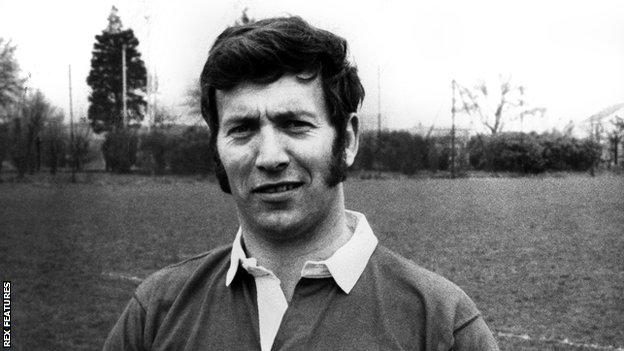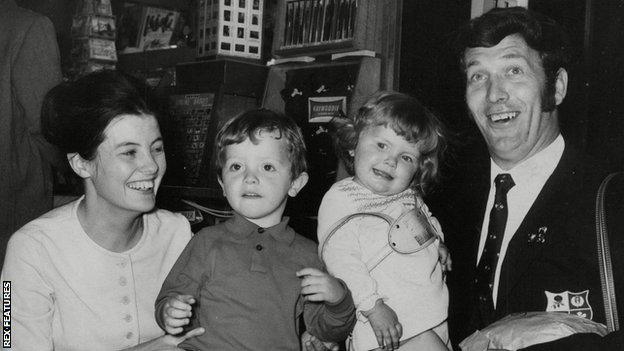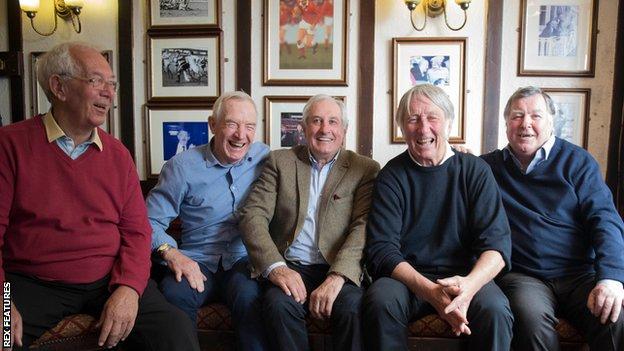John Dawes: Remembering a mastermind of Welsh rugby's golden era
Last updated on .From the section Welsh Rugby

The legend of John Dawes still echoes strongly around the hallowed ground of Old Deer Park.
It is not only the Richmond home of London Welsh, but also the birthplace of a new and glorious brand of attacking rugby that was masterminded by the man of Gwent.
It was a brand that would not only transform the fortunes of Wales, but also the then British Lions.
As you walk around the clubhouse Dawes called home in the 1960s and 1970s, you will see his name listed proudly on the roll of honour, while his precious achievements are preserved behind glass for all to see but not to touch.
Dawes died aged 80 last April, and now some of his family have been given special permission to unlock the cabinet doors, along with a lifetime of memories.
"It's the first time I've ever touched his jersey," said Dawes' son Mike.
"To touch the jersey of the captain of the British Lions, who went down under with 32 of his mates and beat them, it was quite a special moment - spine-tingling at times.
"Seeing his name on the wall was sad, but also made me proud because of his legacy. His memory lives on."
Dawes' legacy as the lion who tamed the All Blacks and the visionary who lit the flame under the Welsh dragon features in the new BBC One Series, Legends of Sport.
It looks back on some of the greatest and most inspiring sportsmen and women Wales has produced - from the underdogs who defied the odds to the game-changers.
Dawes was an Abercarn war baby, but was never destined for a life down the pits. Instead he became one of the first of his family to go to university having been educated at Lewis School Pengam, the so-called 'Eton of the Valleys'.
He moved to London in 1963 to pursue his wife's dream as an opera singer, and as a Welshman living in the English capital, there was only one place to go play rugby.
Dawes not only played for London Welsh, but transformed the ethos at the club, taking people out of the pub and onto the training field.
His emphasis was attack, attack, attack, which required quick ball, great skill and great fitness from backs and forwards alike.
Inspiration came from Busby Babes and the way Manchester United played in the 1950s - to entertain and to win.

The running rugby would soon attract a golden crop of Welsh exiles including JPR Williams, Mervyn Davies, John Taylor and Gerald Davies.
"They (London Welsh) had a wonderful name in rugby football back at that time," said Wales and Lions wing Davies.
"They were renowned for their open, attacking game. People from all over London, not necessarily Welsh, came to see and John Dawes had a great deal to do with that."
The year 1971 was the golden one for those players. Dawes not only led Wales to a Five Nations Grand Slam title, he made history as captain of the British Lions as they secured their first and only series victory in New Zealand.
He said at the time: "I'll look back on this year with a great thrill and know that it's been well worth it."
Two years later, New Zealand were on British shores looking for revenge, with the game against the Barbarians at Cardiff Arms Park dubbed the 'fifth Test'.
Once again Dawes captained the side as the curtain fell on a magnificent playing career, and the final script could not have been written better as he played a part in rugby's greatest try.
The score epitomised what Dawes was all about. It was the ultimate team try, as Phil Bennett launched an attack from deep inside the Barbarians' half, the ball skilfully passed from backs to forwards before Sir Gareth Edwards sprinted over.
The result was another victory over the mighty All Blacks.
After hanging up his boots, Dawes enjoyed a successful coaching career, leading Wales to four Five Nations titles, including two Grand Slams and four triple crowns. He was also coach of the 1977 Lions in New Zealand.

Dawes was inducted into World Rugby's Hall of Fame in 2016 and will forever be remembered as one of the key architects of the golden era of Welsh rugby.
But to his friends and his team-mates, he was John.
This is how they remember him:
Sir Gareth Edwards: "John was a superb player in his own right and brought the best out in us.
"A great pillar of strength when you were going through a difficult time. He was one of the boys, yet he could be management at the same time."
John Taylor: "I would unashamedly say that John Dawes has had more influence on rugby and the way it's played than any other player or coach I've ever known.
"He changed the way New Zealand played their game by masterminding the beating of them down there. He's certainly changed the whole tempo of the game in Wales and the modern game has evolved out of that."
Gerald Davies: "He was the kind of captain that was always calm, patient and believed at whatever time we could win. He was always confident in the quality of the players and of the team he led."
And the final word to the man who knew him as dad, Mike Dawes: "Nowadays people look back on those times with a lot more fondness and realise it was a special time.
"It was great to watch, and I think the mark he left in rugby football brings a smile to everybody's face and that's basically what he loved doing. He liked having fun and enjoying himself."
Legend of Welsh Sport: John Dawes airs on BBC One Wales on Wednesday, 9 February at 21:30 GMT.

- LEGENDS OF WELSH SPORT: Game changers who revolutionised their sports and their country
- SCRUM V PODCAST: The latest Six Nations rugby news and views




















